redo Jump to...
print Print...
VENEZUELA – Opposition leader sits out dialogue called by Maduro
CARACAS – A meeting billed as a national dialogue for local and state officials in troubled Venezuela convened Monday without the country’s most prominent opposition leader.
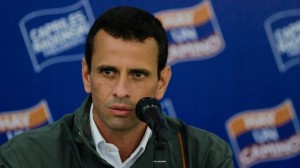
Henrique Capriles
Gov. Henrique Capriles, the opposition candidate in the last two presidential elections, said he would not attend the meeting called by President Nicolas Maduro amid political turmoil that has engulfed the country in recent weeks.
Capriles did not say whether he would also sit out a national peace conference called by the president for Wednesday. Capriles, governor of wealthy Miranda state, told reporters that attending Monday’s meeting would look like an endorsement for a government that he says has engaged in “repression” as troops and police have clashed with protesters.
“I am not going to make Nicolas Maduro look good … That is what they want, that I go there as if the country was absolutely normal,” he said.
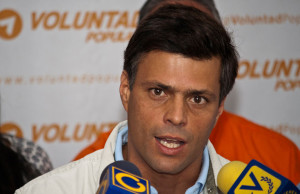
Leopoldo Lopez
Capriles also said he would not participate while another opposition leader, Leopoldo Lopez, remains jailed along with dozens of others who have taken part in anti-government protests.
Lopez, a former mayor of a district in the capital, is being held in a military jail outside Caracas on charges that include criminal incitement of violence for organizing a mass opposition rally Feb. 12 that was followed by clashes that resulted in three deaths and set off waves of unrest that have roiled Venezuela ever since.
His wife, Lillian Tintori, said Lopez believes the time is not right for members of the opposition to sit down with Maduro.
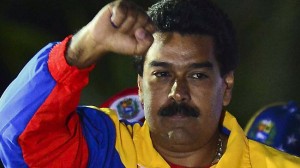
Venezuelan President Nicolas Maduro
“Look at the statements from [President] Nicolas Maduro, every time he speaks, he insults us, he speaks with aggression, speaks with hate,” she said following a news conference to announce a march Wednesday by opposition women.
Monday’s session of the Federal Government Council was a previously scheduled meeting of all Venezuela’s mayors and governors to discuss social and economic problems. At a special meeting of the group in January, following the slaying of a prominent actress and her husband in a robbery, Capriles and Maduro shook hands in a rare showing of cooperation.
This time, Capriles said he felt conditions were wrong for the encounter. “The only thing Maduro wanted was a handshake and a photo so he can tell the world that everything is OK,” Capriles said.
UGANDA – Government defends anti-gay law despite foreign pressure
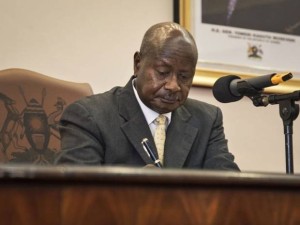
Ugandan President Museveni signs law, said he was standing up to “Western social imperialism”
Uganda’s President Yoweri Museveni said he wanted no lectures from Western governments opposed to the country’s bill prohibiting homosexuality before he signed it into law Monday. Lawmakers had passed the bill in December.
President Museveni, in a response to U.S. criticism of the bill said “Africans do not seek to impose their views on anybody. We do not want anybody to impose their views on us. This very debate was provoked by Western groups who come to our schools and try to recruit children into homosexuality. It is better to limit the damage rather than exacerbate it.”
President Obama said in a statement Sunday that the bill is a “step backward for all Ugandans” and warned that enacting it would “complicate” the East African country’s relationship with Washington.
The bill is widely popular in Uganda, where it has been championed by Christian clerics and politicians who say it is necessary to deter Western homosexuals from “recruiting” Ugandan children. “This law was provoked by arrogant and careless Western-based groups that are fond of coming into our schools to recruit our young children,” Museveni said in a televised speech shortly after signing the bill. “Can somebody be homosexual purely by nature without nurture? The answer is: ‘No.’ “
The bill originally proposed the death penalty for a category of offenses called “aggravated homosexuality.” Amid international pressure including the threat to withdraw aid by European countries such as Sweden, the death penalty was removed. On first conviction for homosexual acts, offenders face a 14-year prison sentence. Subsequent convictions for “aggravated homosexuality,” which include homosexual acts committed by an HIV-positive person, could instead bring as the maximum penalty life in prison.
 The United Nations agency on HIV/AIDS, UNAIDS, warned last week that the Ugandan law could compel homosexuals to shun HIV testing and treatment to evade arrest. Only around 30% of the nation’s 35 million people have been tested, according to government data. Western donors – including the U.S., Canada and European Union – have warned that the law could jeopardize Uganda’s foreign aid, upon which the country relies for at least $2 billion every year.
The United Nations agency on HIV/AIDS, UNAIDS, warned last week that the Ugandan law could compel homosexuals to shun HIV testing and treatment to evade arrest. Only around 30% of the nation’s 35 million people have been tested, according to government data. Western donors – including the U.S., Canada and European Union – have warned that the law could jeopardize Uganda’s foreign aid, upon which the country relies for at least $2 billion every year.
Mr. Museveni, a Christian, this month said he would sign the bill, after citing a report from Ugandan medical experts who said homosexuality isn’t “genetic but a social behavior.” Museveni also said he is open to debate about homosexuality and that he does ‘‘encourage the U.S. government to help us by working with our scientists to study whether, indeed, there are people who are born homosexual. When that is proved, we can review this legislation.’’
The latest move by Uganda reinforces an already tough stance among African governments against homosexuality. A same-sex relationship is considered taboo in many African societies, and it is illegal in around two-thirds of countries on the continent.
Mr. Museveni asked the U.S. to respect Uganda’s sovereignty in decision making for its people. “Valued relationship cannot be sustainably maintained by one society being subservient to another society,” he said, in response to Mr. Obama’s criticism. “Countries and societies should relate with each other on the basis of mutual respect and independence in decision making.”
“If the West does not want to work with us because of homosexuals, then we have enough space to ourselves here,” Museveni added, accusing those who told Uganda how to act were guilty of “social imperialism.”
Museveni earlier this month also signed into law anti-pornography and dress code legislation which outlaws “provocative” clothing, bans scantily clad performers from Ugandan television and closely monitors what individuals view on the Internet.
BRAZIL – Brazil, Europe plan undersea cable to skirt U.S. spying
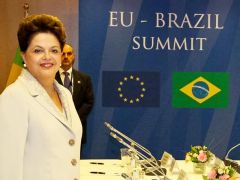
Brazil’s President Dilma Rousseff
Brazil and the European Union agreed on Monday to lay an undersea communications cable from Lisbon [Portugal] to Fortaleza [Brazil] to reduce Brazil’s reliance on the U.S. after Washington spied on Brasilia.
At a summit in Brussels, Brazilian President Dilma Rousseff said the $185 million cable project was central to “guarantee the neutrality” of the Internet, signaling her desire to shield Brazil’s Internet traffic from U.S. surveillance.
“We have to respect privacy, human rights and the sovereignty of nations. We don’t want businesses to be spied upon,” Rousseff told a joint news conference with the presidents of the European Commission and the European Council.
“The Internet is one of the best things man has ever invented. So we agreed for the need to guarantee … the neutrality of the network, a democratic area where we can protect freedom of expression,” Rousseff said.
Rousseff postponed a state visit to Washington last year in protest at the U.S. National Security Agency spying on her email and phone and is now seeking alternative routes to U.S. cables.
Brazil relies on U.S. undersea cables to carry almost all of its communications to Europe. The existing cable between Europe and Brazil is outdated and only used for voice transmission.
EU leaders are sympathetic to Brazil’s call following the revelations of fugitive former NSA contractor Edward Snowden that showed the agency also eavesdropped on German Chancellor Angela Merkel’s mobile phone and some EU institutions. …
Brussels is threatening the suspension of EU-U.S. agreements for data transfers unless Washington increases guarantees for the protection of EU citizens’ data. …
Rousseff said Brazil and the European Union have “similar concerns” about U.S. dominance of fiber-optic cables and hoped to have a cable running from the Portuguese capital Lisbon to the northeastern Brazilian of Fortaleza by next year.
Under current plans, a joint venture between Brazilian telecoms provider Telebras and Spain’s IslaLink Submarine Cables would lay the communications link. Telebras would have a 35 percent stake, IslaLink would have a 45 percent interest and European and Brazilian pension funds could put up the remainder.
One official said that because Brazil had more to gain from the project than the European Union, its overall stake in the project would have to be larger than 50 percent and so Brazilian funds would put up more. …
(The news briefs above are from wire reports and staff reports posted at NY Daily News on Feb. 24, AP, AFP and WSJ on Feb. 21 & 24 and Reuters on Feb. 24.)
Questions
1. For each of the 3 countries, provide the following information:
a) capital:
b) location/the countries that share its borders:
c) the religious breakdown of the population:
d) the type of government:
e) the chief of state (and head of government if different) [If monarch or dictator, since what date has he/she ruled? – include name of heir apparent for monarch]:
f) the population:
NOTE: Before answering the questions below, read the info under “Background” and watch the videos under “Resources.”
2. For VENEZUELA:
a) list the who, what, where and when of the news item
b) For what reasons did Gov. Capriles decline to attend talks with socialist President Nicolas Maduro and other governors and mayors?
3. For UGANDA:
a) list the who, what, where and when of the news item
b) How do Ugandans view the new law?
c) What do you think of President Museveni’s response to U.S. criticism of the bill: countries “should relate with each other on the basis of mutual respect and independence” that “Africans do not seek to impose their views on anybody. We do not want anybody to impose their views on us.” Do you think he makes a legitimate point or is this different than other types of cultural differences? Explain your answer.
d) The U.S. and other Western countries have not threatened to end aid to countries that have other laws we oppose, e.g.
-requiring women to be fully covered head to toe before leaving the house
-not permitting women to go outside the house without a male family member
-forcing a woman to marry against her will
-condoning/encouraging honor killings
-allowing a Caste system to continue unofficially, etc.
How do you think the U.S. should select which human rights we choose to defend by ending financial to the offending country?
4. For BRAZIL:
a) list the who, what, where and when of the news item
b) Why does Brazil currently rely on U.S. undersea cables to carry almost all of its communications to Europe?
c) Read the “Background” below. What do you think governments, including ours, should/could do to really secure their confidential communications?
Background
VENEZUELA
Since Feb. 12, opponents of Maduro have been staging countrywide protests that the government says have left at least 15 people dead and wounded about 150. Authorities have detained 579 people, of whom 45, including nine police officers and members of the National Guard, remain in custody, Attorney General Luisa Ortega Diaz said.
Though violent protests have died down, Venezuela remains tense. Opposition protesters erected barricades to block traffic on major streets in Caracas and elsewhere Monday, but there were no major clashes.
Tachira state Gov. Jose Vielma Mora, a member of Maduro’s party, said the government should release all those detained, including Lopez, to promote peace. Then, in a very rare public criticism by a ruling party member, Vielma faulted as excessive some elements of the government’s response to the protests in his state, including deploying warplanes to buzz over opposition protests.
The opposition blames Maduro’s administration for the country’s high crime rate and economic troubles and says his socialist-inspired polices have led to shortages of basic goods and inflation above 50 percent, among the world’s highest, despite the country’s vast oil reserves.
The president blames the violence on right-wing opponents of his government, accusing them of receiving support from abroad.
Maduro said Monday that authorities in the central state of Aragua had detained a “mercenary” from an unidentified Middle Eastern nation. Gov. Tareck El Aissami said on Twi
UGANDA:
- Uganda is a key Western ally in the fight against Islamic extremism in Somalia, where Ugandan troops form the backbone of the African Union force battling al Qaeda-aligned militants.
- A senior Obama administration official had said the United States would review relations with Uganda if the law was enacted. Washington is one of Uganda’s largest donors, sending more than $400 million a year.
- British Foreign Secretary William Hague said on Monday London questioned the bill’s compatibility with the Ugandan constitution and international treaty obligations. But he made no mention of aid cuts from Britain, another big donor.
- Austria said it was reviewing its assistance. Denmark said it was diverting 50 million crowns ($9 million) of development aid away from the Ugandan government and Norway said it would hold back 50 million krone ($8 million) of support.
- “We cannot distance ourselves too strongly from the law and the signal that the Ugandan government now sends to not only persecuted minority groups, but to the whole world,” Danish Trade and Development Minister Mogens Jensen said.
- But analysts said any Western penalties could be tempered because Kampala was seen as a valuable regional ally, while Uganda expects to pump oil for the first time in 2016 and hopes the inflow of petrodollars will cut aid dependence.
- A Ugandan government spokesman said Museveni had taken the unusual step of signing the bill in public to “demonstrate Uganda’s independence in the face of Western pressure.”
- While African leaders broadly court Western donors with promises to tackle human rights abuses, many have won popular support by describing homosexuality as “un-African” behavior.
- “We don’t like (homosexuality) in our culture,” said motor-bike taxi driver Ronald Kibabu. “That can keep him as president. The election is coming.”
- The lawmaker behind the bill, David Bahati, praised the decision to sign it. “This is the moment the world has been waiting for,” he told AFP. “We thank our president for taking such a bold move despite pressure from a section of foreign organizations. The law is for the good of Uganda, the current and the future generations.”
- In neighboring Kenya, a group of MPs has called for the enforcement of existing anti-gay laws that have been largely ignored. Some Kenyans praised Uganda’s actions. “Kudos to #Museveni for refusing to bow to #Obamademands on the homosexuality law,” said Kenyan Twitter user @Chabbuh. (from a Reuters report)
- Some donors were quick to punish Kampala by freezing or redirecting aid money. The Netherlands froze a seven-million-euro subsidy to Uganda’s legal system arguing that “if the judiciary is to enforce such laws, we do not wish to assist that process.” Denmark and Norway said they would redirect around six million euros each in government aid towards private sector initiatives, aid agencies and rights organizations.
- Last week, President Obama said that signing the law would “complicate” the relationship the U.S. has with Uganda, but it is unclear how substantially ties might change.
- “Now that this law has been enacted, we are beginning an internal review of our relationship with the government of Uganda to ensure that all dimensions of our engagement, including assistance programs, uphold our antidiscrimination policies and principles and reflect our values,” Secretary of State John Kerry said on Monday.
- The U.S. and Uganda are close military allies. The U.S. spends millions of dollars every year to support Ugandan troops. Kampala is a key Western ally in the region, where it is seen as a bulwark against the spread of radical Islam and has volunteered thousands of troops to battle Somali militants linked to Al-Qaeda. (from the WSJ and AFP reports)
BRAZIL
- At the one-day summit in Brussels, there was no public criticism of the United States, which remains the European Union’s closest ally.
- But Brazil’s President Rousseff clearly took heart from German Chancellor Angela Merkel’s calls this month for a European Internet that is protected from U.S. surveillance, even if there are questions about the practicalities of setting up alternative networks in Europe. (from the Reuters article)
From a Sept. 2013 article from theverge .com:
Brazilian president Dilma Rousseff announced plans to create an undersea fiber-optic cable that would funnel internet traffic between South America and Europe, bypassing the US entirely. Rousseff also urged legislators to pass an amendment that would force Google, Microsoft, and other US web companies to store data for Brazilian users on servers located within Brazil, while the country’s postal service has already begun developing an encrypted domestic email system.
The moves come as a direct response to allegations that the National Security Agency (NSA) has been eavesdropping on Rousseff’s phone calls and emails, according to classified documents leaked by whistleblower Edward Snowden. The reports, published earlier this year, have escalated diplomatic tensions between the Obama administration and Rousseff, who yesterday accused the US of violating international law in a scathing speech to the United Nations General Assembly.
Rousseff’s proposals rest upon the premise that by routing web traffic away from American soil and keeping data within Brazil, the Brazilian government could more easily control and secure citizens’ online information. But experts say the plans would do little to stop the NSA from spying on Brazilian communications, and some worry that they could lead to a more fractured internet.
“Just because you take steps to make it more difficult for the NSA doesn’t mean the NSA packs up their stuff and goes home,” says Christopher Soghoian, principal technologist and senior policy analyst at the American Civil Liberties Union (ACLU).
The majority of internet traffic to Central and South America flows through a single building in Miami, known as the Network Access Point of the Americas. Bypassing that route with a new cable would require years of work and billions of dollars, and likely would have little effect on NSA surveillance, Soghoian says. The US already has a nuclear submarine explicitly dedicated to tapping undersea internet cables, and has proven its ability to hack into the computer networks of foreign governments.
Forcing companies to store data locally would make it easier for Brazilian authorities to access information held by US-owned corporations, but Soghoian warns that it wouldn’t make things much harder for the NSA; because both companies are based in the US, American officials could still force Google or Facebook to hand over that data through subpoena or court order, regardless of where their servers are located. Brazil could implement encryption techniques to make it harder for the NSA to access emails, he notes, but the strongest measures could make it difficult for Brazilian authorities to access data, too.
“It’s not just about having servers in Brazil, it’s about storing data on servers that are not run by US companies,” Soghoian tells The Verge. “Unless you’re going to make it illegal to use Google, which would be a very high bar, you need to build domestic services that are equally compelling.”

Daily “Answers” emails are provided for Daily News Articles, Tuesday’s World Events and Friday’s News Quiz.



